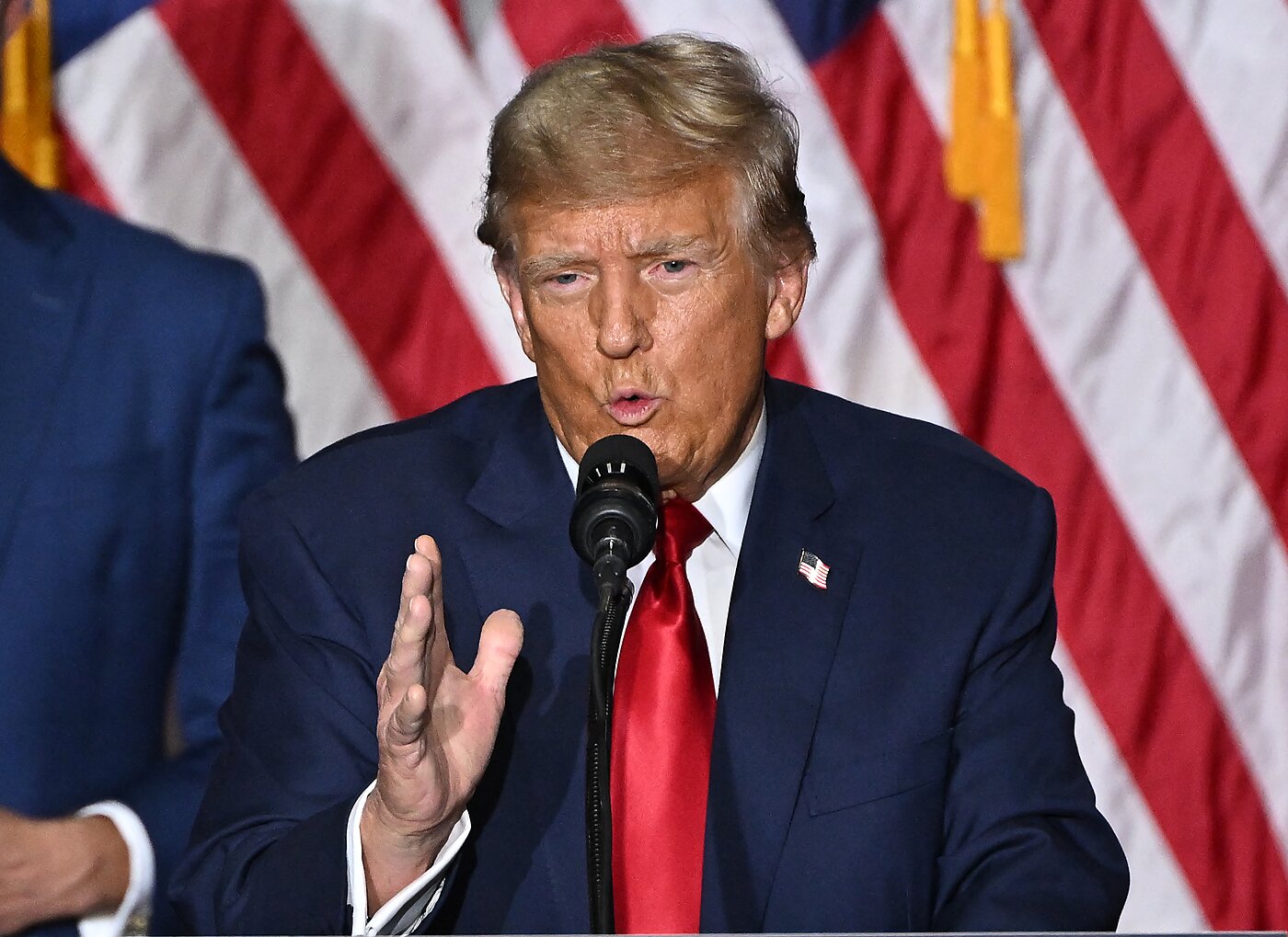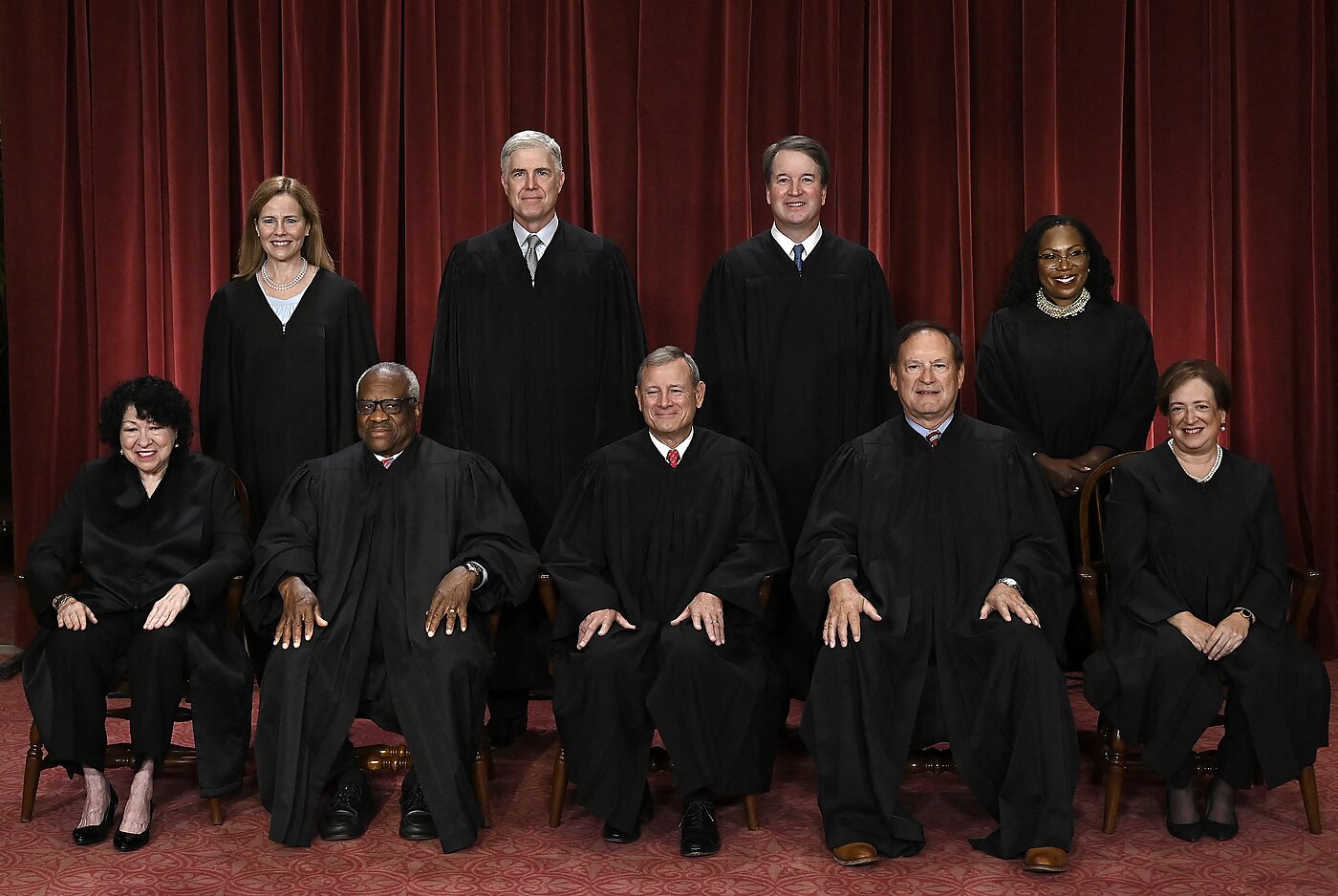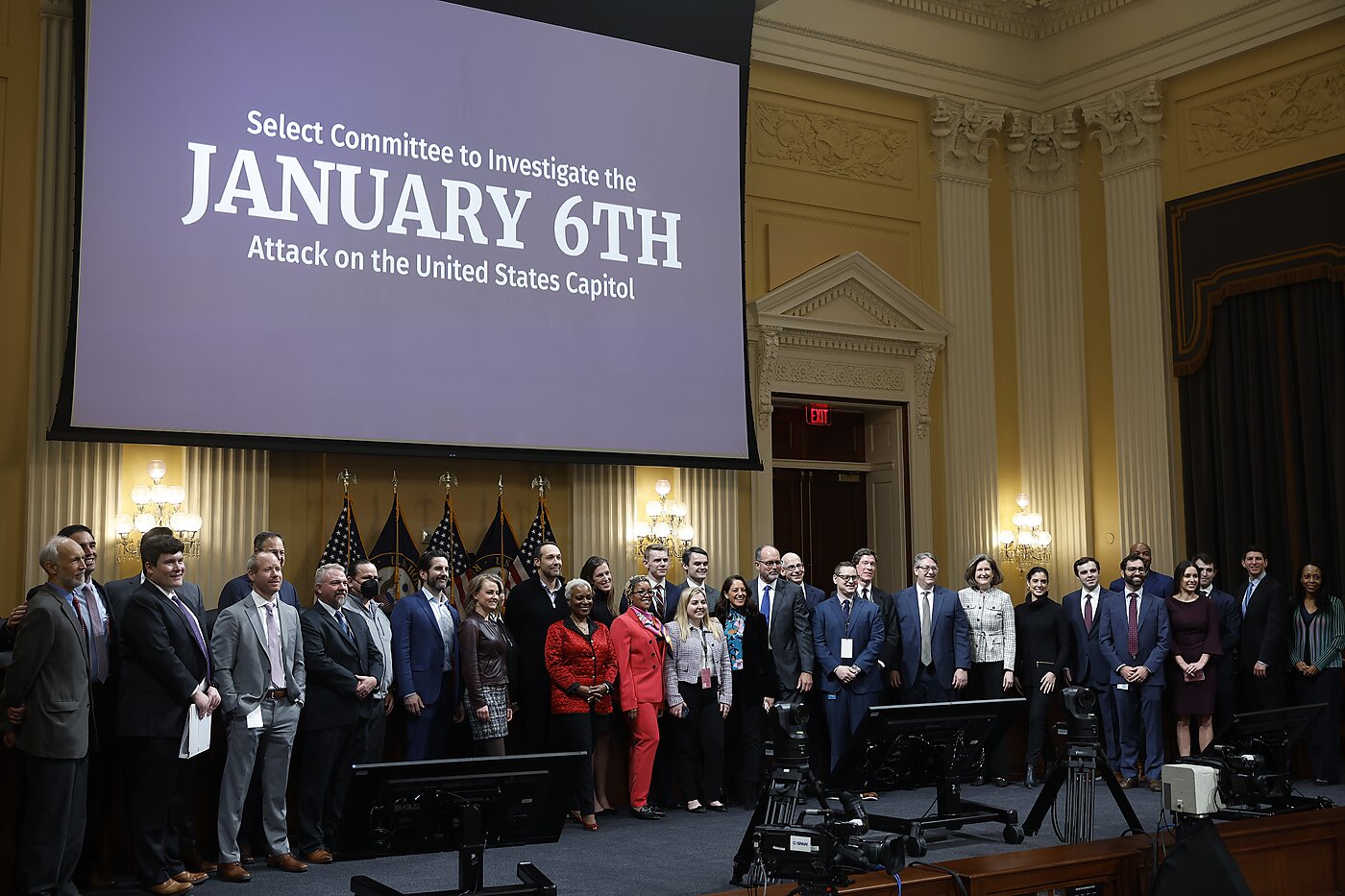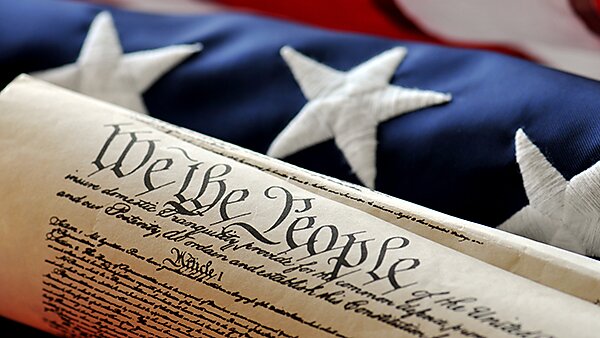James Craven and Patrick G. Eddington

Just three days after the Supreme Court lifted a lower court injunction that blocked federal agents from cutting the razor wire installed at the border by the Texas National Guard, former president Donald Trump urged “all willing States to deploy their guards to Texas to prevent the entry of Illegals, and to remove them back across the border.”
The following day, Trump’s exhortation was answered by the governors of Oklahoma, Idaho, and Florida. It’s a scenario one Trump‐aligned congressman had already described as a civil war before Trump’s clarion call.
This recent crisis is something the justices should keep in mind as they consider whether Section 3 of the Fourteenth Amendment—which prohibits certain people from holding “any office, civil or military” if they “have engaged in insurrection or rebellion”—bars Trump from office.
What could happen if Trump again issues a call‐to‐arms, but this time designed to help him escape a criminal conviction—or worse, to once again contest the will of the voters after losing the coming election? Would governors considering Trump’s request for military support be afraid that their assistance could lead to a Section 3 disqualification that ends their political career? Or would they yield to Trump—again—safe in the knowledge that the Supreme Court had already ruled Section 3 a dead letter?
Many commentators have argued that the court can somehow thread the needle between these outcomes, preserving the strength of Section 3 while leaving Trump on the ballot. Appealing to notions of democracy and implying dire consequences if the court fails to heed their warnings, they urge that the court can dodge the issue this time, and in doing so, leave the country better off.
But finding a way out of this case would be more dangerous than ruling against Trump—for two reasons.
First, each of the major legal arguments against enforcing Section 3 would substantially damage that constitutional clause, creating a permission structure for would‐be insurrectionists to test new boundaries on Trump’s behalf. The court’s options exist on a spectrum where the most limited holding it could pursue has the least rational force, while more credible (though in our view, still unpersuasive) holdings would explicitly leave Section 3 inoperable in many scenarios. Either approach would create space for new leaders to emerge and attack our constitutional form of government.
Second, assessing the threat of social unrest and violent conflict in the wake of a decision disqualifying Trump and comparing it to the alternative yields a surprising result. While a violent response is possible in the short term, the net effect of a ruling affirming Section 3 would be to decrease the odds of violent conflict by changing the calculus of political leaders who would become less likely to legitimize or directly support insurrection due to the credible fear that they too could be disqualified from office.
Put simply, there is no conflict between the court enforcing the best legal reading of Section 3 to disqualify Trump and the court taking the most prudent course to avoid the worst potential violent outcomes for our nation. Indeed, disqualifying Trump may be our last, best chance to slow our country’s accelerating drift from functional political norms towards a system that increasingly capitulates to violence and intimidation.
—
Proponents of the preserve-Section-3-but-don’t‑use-it-now approach might most favor the theory that Section 3 does not apply to the office of the presidency. This idea—that the presidency is not a “civil or military office”—relies less on the plain meaning of those words and more on the presence of others: that specific prohibitions on insurrectionists holding the offices of “Senator or Representative” and “elector of President and Vice‐President” exempt the office of the presidency by omission.
Kurt Lash, for one, argues that it’s “common sense” that “Section 3 is structured in a manner that moves from high federal office to low state office, and the apex federal political offices are expressly named.” Joshua Blackman, making light of scholarship urging Trump’s disqualification, headlines a similar argument in his two‐hundred‐and‐thirty‐eight page article “The Sweeping and Forcing of the President into Section 3.” Some optimists may see the upshot of such a ruling as allowing the presidential election to go forward while preserving the legitimacy of Section 3 for, say, those governors inclined to deploy the National Guard when Trump says they should.
Is that plausible? Setting aside the perhaps more common‐sense understanding that the presidency is both a civil and a military office, this argument was already answered over 150 years ago when Section 3 was debated on the Senate floor. As noted by scholar Gerard Magliocca and republished in a Congressional Research Service report on Section 3:
During the debate on Section Three, one Senator asked why ex‐Confederates “may be elected President or Vice President of the United States, and why did you all omit to exclude them? I do not understand them to be excluded from the privilege of holding the two highest offices in the gift of the nation.” Another Senator replied that the lack of specific language on the Presidency and Vice‐Presidency was irrelevant: “Let me call the Senator’s attention to the words ‘or hold any office, civil or military, under the United States.’”
A Section‐3‐does‐not‐apply‐to‐presidents ruling thus has three major problems. First, it would have to ignore the plain meaning of “civil or military office.” Second, it would have to credibly maintain that the drafters of Section 3 intended for insurrectionists to be eligible for the most powerful political office, just not less powerful ones. Third, it would have to maintain that assertion despite plain evidence that the drafters of Section 3 said that they did not intend to do that. The deep flaws of this argument would likely be laid bare not just by the media, but by the dissents.

Would a ruling so devoid of rational force dissuade anyone from testing the limits of Section 3? We think it would not.
What about the argument that Section 3 can only be enforced by an act of Congress?
As our colleague Ilya Somin covers more at length, Section 3 itself provides for no enforcement mechanism and no such enforcement mechanism has ever been required for any other qualification for president.
And if the Reconstruction‐era Congress had intended that another law was required to give force to Section 3, why would they not have passed it immediately after passing Section 3? Was such authority supposed to be found in the Readmission Act passed before Section 3? If so, wouldn’t that act still keep Section 3 operable? The act states that “no person prohibited from holding office under the United States, or under any State, by section three of the proposed amendment to the Constitution of the United States, known as article fourteen, shall be deemed eligible to any office in either of said States, unless relieved from disability by Congress” (Ch. 70. 15 Stat. 74). It has not been repealed.
Moreover, it seems plenty of others agreed that Section 3 was in full operation after it was passed, because many people were disqualified from office during Reconstruction despite the absence of either criminal convictions or Section 5 enabling legislation.
We recognize, however, that a circuit court ruling by Chief Justice Salmon P. Chase did hold that Section 3 is not self‐executing in a case where ruling otherwise would have resulted in a convicted murderer being allowed back on the street. We note that in a prior case, Chase had argued that Section 3 was self‐executing, and in fact that it was the sole criminal punishment intended for Confederate officers in the wake of the Civil War. But more pressingly, we note that the Court is not bound by Chase’s circuit court opinion—and to follow it would leave little left of Section 3.
If Section 3 required an act of Congress to have force, then candidates like Trump would have a strong chance of escaping its consequences even when engaging in outright rebellion so long as the opposing party does not have filibuster‐proof majorities in both chambers. This would effectively allow future insurrectionists to reliably game out whether they are safe from Section 3’s consequences or not. And in most cases, they would be.
Finally, consider the argument that Trump did not truly engage in “insurrection.” Because the court only reviews the facts below for clear error, and because the factual record below is robust, the court would likely have to redefine insurrection so that it no longer meets the facts of the case to find that Trump did not engage in one.
This would be fraught. To begin with, Congress has already plainly recognized January 6 as an insurrection.
On June 30, 2021, the House of Representatives passed H. Res. 503, which established the Select Committee to Investigate the January 6 Attack on the United States Capitol. In the Select Committee’s final report, the committee members used the word “insurrection” no fewer than 78 times to describe the actions of President Trump, his confederates, and members of the mob that attacked the Capitol. The Committee also voted out multiple criminal referral charges to the Department of Justice, most significantly including 18 USC 2383: Rebellion or insurrection.
And on January 13, 2021, the House impeached Trump for “insurrection,” with a bipartisan majority of the Senate voting to convict. That bill specifically invokes Section 3:
…section 3 of the 14th Amendment to the Constitution prohibits any person who has “engaged in insurrection or rebellion against” the United States from “hold[ing] any office … under the United States”. In his conduct while President of the United States—and in violation of his constitutional oath faithfully to execute the office of President of the United States and, to the best of his ability, preserve, protect, and defend the Constitution of the United States, and in violation of his constitutional duty to take care that the laws be faithfully executed—Donald John Trump engaged in high Crimes and Misdemeanors by inciting violence against the Government of the United States.
Though that vote fell short of the two‐thirds threshold constitutionally required for impeachment, it’s telling that fifty‐seven senators embraced this language. We also note that an impeachment‐level supermajority would not be necessary if, as discussed above, some specific legislative action were required to enforce Section 3. We maintain that it is not, but if it were, both of these legislative actions could potentially overcome that hurdle.

Finally, the court would have to circumscribe not only the colloquial meaning of “insurrection,” but its historical meaning too. The Colorado Supreme Court opinion, taking a page from the work of originalist scholars William Baude and Michael Paulsen, makes a convincing case that Trump’s actions fall within the contours of any plausible definition of “insurrection.” Take, for instance, this one from Noah Webster’s dictionary at the time Section 3 was passed:
Rising against civil or political authority; the open and active opposition of a number of persons to the execution of law in a city or state. It is equivalent to SEDITION, except that sedition expresses a less extensive rising of citizens. It differs from REBELLION, for the latter expresses a revolt, or an attempt to overthrow the government, to establish a different one, or to place the country under another jurisdiction.
Any attempt to redraw these boundaries would in effect install a high ceiling under which a wide range of insurrection‐like activity could proliferate without fear of disqualification. This would provide substantial room for politicians to follow Trump’s lead knowing Section 3 would pose no obstacle.
—
But even if it is clear that a Supreme Court refusal to apply Section 3’s disqualification mechanism to Trump would rob the constitutional provision of its force, must the court do so anyway to prevent dire social consequences? We do not deny that disqualifying Trump could incite organized, violent efforts to defy the court’s order. But a complete analysis requires acknowledging that if Trump would be willing to employ such tactics here, he would, most likely, employ similar tactics at any stage of his defeat.
Below is our analysis of the risks the nation would face in the wake of Trump’s disqualification, and our explanation of why accepting these risks now is better than the alternative.
While 74,223,369 Americans voted for Trump in 2020, only about 3,000 appear to have participated in the breach of the Capitol (based on those arrested, pled out, convicted, or still being sought), which works out to 0.00404185372 percent of Trump voters and just 0.00091047041 percent of the US population as a whole.
The attempted insurrection was unprecedented, arguably treasonous, terrifying for those on the receiving end of mob violence and threats, and fatal for some (either at the time or later)—but it was also an isolated event.
There was no attempt by Trump supporters to raid National Guard or Reserve facilities for weapons, explosives, etc. in support of a general uprising. Despite the high level of political polarization and endless trash‐talk on social media and cable network channels, there was no broad‐based, country‐wide uprising against the federal government by Trump supporters during or after January 6, 2021.
Some would argue that after more than three years of being fed a steady stream of lies about the outcome of the 2020 election, an assumption that there would be no mass uprising by Trump supporters if the Supreme Court upholds the Colorado Supreme Court’s decision is a bad bet. To be sure, the recent and ongoing defiance by Texas even after the Supreme Court attempted to clarify federal legitimacy in immigration and border security decisions is a troubling sign, and the ease with which Trump convinced several governors to join the effort is more troubling still. Even so, these and related events only underscore why the court should affirm the Colorado Supreme Court’s decision.
Section 3’s disqualification provision would leave Trump with vanishingly small odds of lawfully attaining power. That would dissuade his allies in state and local government from marshaling their troops because they would have little reason to believe Trump could protect them from the consequences and every reason to believe they would be subject to the same disqualification. And it would give pause to Trump’s numerous, would‐be successors who may seek to imitate him through more January 6 scenarios.

Alternatively, if the court were to reverse the Colorado decision and render Section 3 effectively unenforceable, it would likely embolden Trump and his most extreme supporters to believe that he can act with impunity if he manages to evade conviction in his pending criminal cases and ultimately win back the presidency. And if they sensed that the court avoided disqualifying Trump out of a fear of violence, then their use of violent threats would be validated and encouraged.
It’s fair to be concerned that among the tens of millions of Trump’s supporters, there is a potential critical mass of individuals with sufficient training, equipment (read: firearms), and motivation to engage in violence directed at symbols of federal governmental authority, perhaps even including some public officials. And while in the beginning such persons might act individually or in small groups, the potential for the formation of larger, more cohesive paramilitary formations cannot be ruled out.
Right now, that risk is likely heavily offset by the successful and ongoing manhunts and prosecutions of those who engaged in the January 6, 2021, insurrection. Key leaders involved in that event are behind bars, and two of the most prominent organizations responsible for the breach of the Capitol either no longer functionally exist (Oath Keepers) or have become so decentralized (Proud Boys) so as not to represent a credible threat to the authority and stability of the federal government.
But if political leaders give these groups legitimacy, that could change. While a ruling disqualifying Donald Trump under Section 3 would give politicians who might consider embracing these efforts pause, a refusal to disqualify Trump would instead give them confidence that there is a degree of political violence the system will tolerate.
The worst‐case scenario is that, like the current border standoff, political actors could directly support Trump’s efforts by deploying state troops or the National Guard and employing other armed, paramilitary elements as auxiliaries. This could provide these disparate groups the organization and focus necessary to do serious damage to our constitutional republic.
Section 3 of the Fourteenth Amendment is a powerful guardrail for democracy that was won at a high cost to our country. The court should enforce this powerful provision to disqualify Trump, and in doing so, protect both the nation and the rule of law.





















